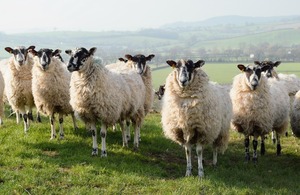United Kingdom

Important Facts of the News
- Total 154 bluetongue cases recorded in Great Britain during the 2025 season.
- England reported 141 cases, Wales reported 13 cases, and Scotland reported none.
- BTV-3 is the dominant strain, with isolated cases of BTV-8 and some mixed infections.
- New cases confirmed on multiple dates between 24 October and 1 November 2025.
- All-Wales Restricted Zone will take effect from 10 November 2025.
- A temporary control zone is currently in place around a site in Monmouthshire.
- Restricted zone for bluetongue has covered all of England since 1 July 2025.
- Risk of onward midge transmission currently considered very low but infection risk remains.
- Licensing is required for freezing germinal products in England.
- Control strategy includes surveillance, movement rules, vaccination guidance and biosecurity.
Overview
The ongoing bluetongue situation across Great Britain continues to be monitored closely, with new cases confirmed through clinical assessments and routine testing. Since the start of the 2025 bluetongue season in July, a total of 154 cases have been registered. Most detections are linked to bluetongue virus serotype 3, while isolated findings of serotype 8 and mixed infections have also been recorded. No infections have been reported in Scotland during this period.
Recent Case Confirmations
On 1 November 2025, England recorded four new BTV-3 cases in Staffordshire, Leicestershire, Kent and Cornwall, affecting newborn and pre-weaned calves as well as adult cattle. Another case involving both BTV-3 and BTV-8 was confirmed in Cornwall following routine surveillance. Towards the end of October, Wales also confirmed several BTV-3 cases in Monmouthshire and Powys through both surveillance and post-movement testing.
Other confirmations in late October included cases identified during routine testing, pre-movement checks and through clinical reports in Cornwall, Cheshire, Derbyshire, Kent and Gloucestershire. Several of these detections involved groups of cattle, indicating ongoing virus circulation within known affected areas.
Control Zones and Movement Rules
A temporary control zone remains operational around an affected premises in Monmouthshire. In addition, an all-Wales Restricted Zone will come into effect from 10 November 2025, reflecting modelling that suggests very low likelihood of further midge transmission beyond this point in the year.
England has been under a nationwide restricted zone since 1 July 2025, allowing movement of animals within the country without specific licences. However, activities involving the freezing of germinal products such as semen and embryos still require licensing and testing, with associated costs to be covered by keepers.
Risk Level and Preventive Measures
Experts currently assess the risk of onward spread through active midge vectors as very low in most regions, although infection can still occur from previously infected midges or germinal products. The risk of bluetongue entering from external sources remains at a medium level, with airborne spread considered unlikely but not impossible.
Guidance remains available on vaccination against BTV-3, biosecurity practices, livestock identification, movement controls and import regulations. Livestock keepers are reminded to monitor their animals for symptoms and report any concerns promptly.
Bluetongue & Farmed Animals Curated UK Government Links
A neat, printable collection of official guidance, maps, news and downloadable resources related to bluetongue and keeping farmed animals in the UK. All links open in a new tab.
Primary guidance & information
News, status updates & official collections
Government organisations
Maps, dashboards & interactive tools
Regulatory documents, PDFs & leaflets
Regional & devolved government pages
Movement, ID & on-farm requirements
<li